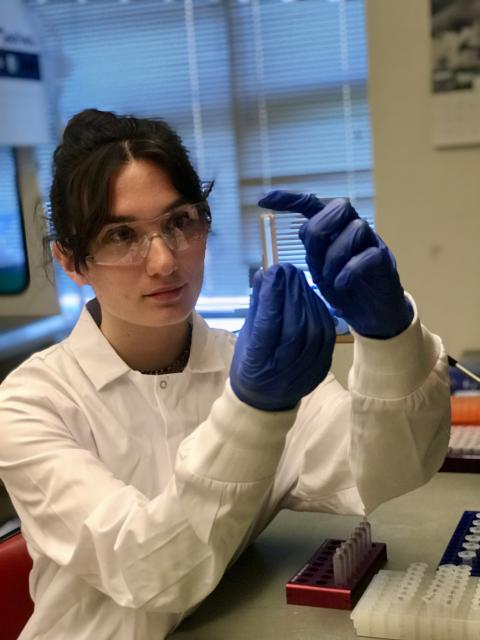
Maggie Krein is an environmental sciences: ecosystems major and double minor in wildlife and conservation biology and sustainable energy. She is from Chester, New Hampshire.
COLSA: Tell us about your research in as non-technical language as possible.
Maggie Krein: I am researching how microplastic pollution impacts the active microbial community in agricultural soil. To do this, I am using a process called quantitative stable isotope probing (qSIP), which involves incubating agricultural soil with different levels of microplastics and introducing water that has a heavy isotope of oxygen (oxygen-18), which acts as an environmental tracer. Active microbes require water for metabolic activity, and in utilizing water, they incorporate the oxygen in water into their DNA. Thus, by introducing water that has the oxygen-18 isotope to agricultural soil, we can trace this labeled water to identify the active microbial community.
Understanding how microplastic pollution affects microbial community composition in soils is critical to the management of soils for soil health and food stability.
COLSA: What challenge/issue does your research seek to address?
Maggie: My research seeks to address the issue of microplastic pollution, specifically in soil. However, my research could have implications for plastic pollution in general. Microplastic pollution from point sources, including management practices, and nonpoint sources, such as runoff and precipitation, are increasing plastic concentrations in agricultural soils, potentially affecting agroecosystem function. However, there is a lack of knowledge surrounding how microplastics influence the active microbial community in soil, which I hope to address with my research.
COLSA: What has your experience conducting undergraduate research been like so far?
Maggie: My experience conducting research has been an eye-opening adventure into the world of scientific research. I have encountered many obstacles that I did not anticipate and am nowhere near as far along in my research goals as I had hoped to be. However, my experiences have helped me to better understand that challenges, unforeseen issues, and mistakes are really what science is built upon.
The scientific process is never as smooth as it seems to an outsider. The research challenges I encountered this summer made the successes I achieved that much sweeter, and though I was discouraged at times, my undergraduate research experience has been rewarding and enlightening.
COLSA: Are there funding sources and/or collaborators we should acknowledge? If so, please list.
Maggie: My PhD mentor, Nate Blais, was beyond helpful in assisting me with my SURF. Without his help, I would not have learned so much this summer nor made as much progress as I did on my research project.
COLSA: What do you love most about UNH?
Maggie: One of the things I love most about UNH is the opportunity provided for undergraduate students to become involved in research. I began working as a lab technician in the fall of my sophomore year, and I know that at most other universities, I would not have had such an opportunity. The climbing wall at the HRC comes in a close second!